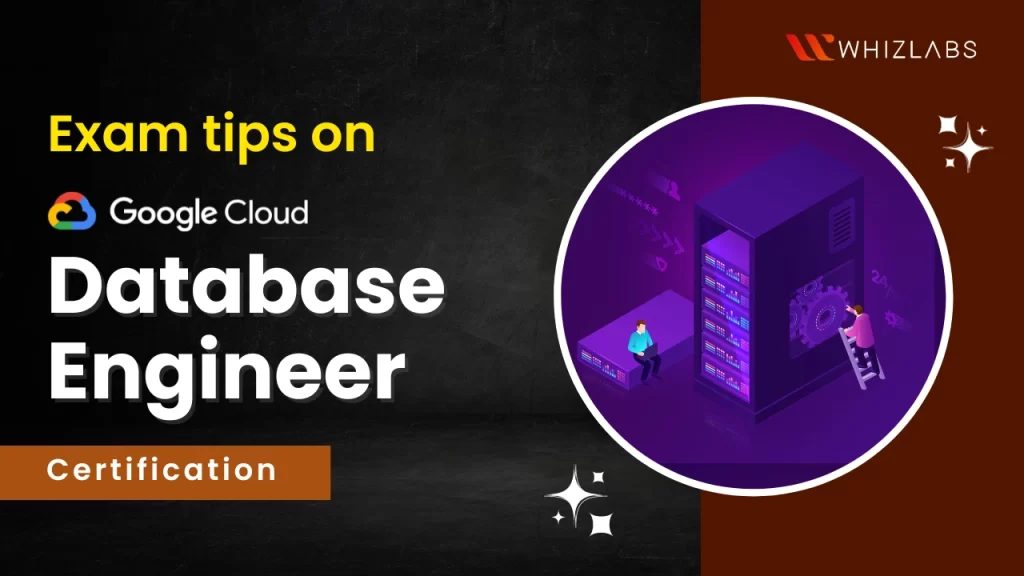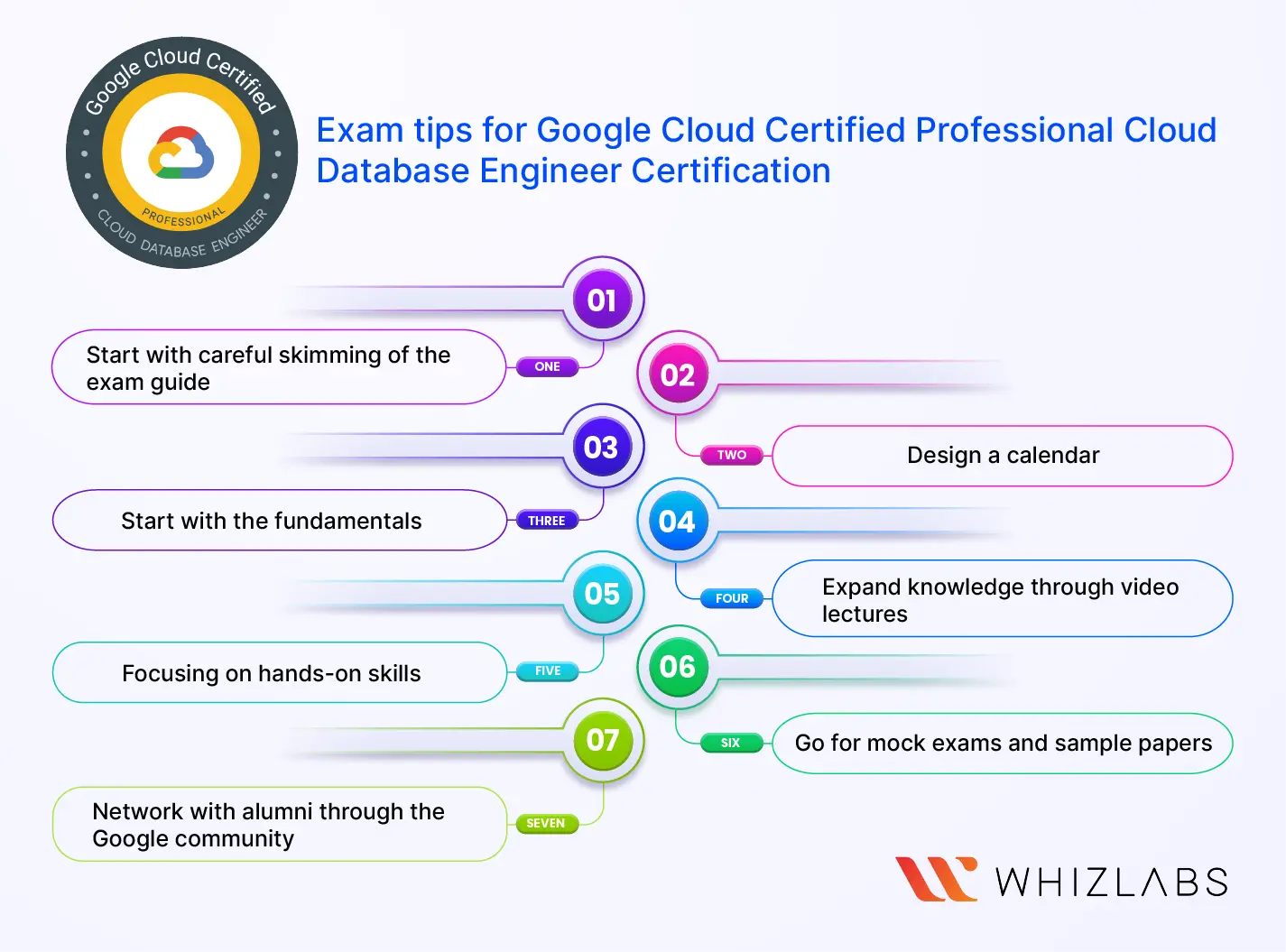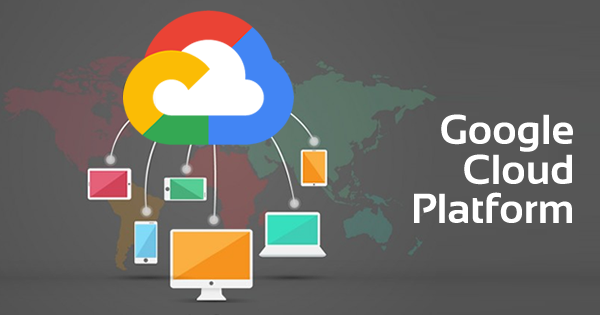Database engineering is undoubtedly one of the most sought-after cloud professions, with innumerable companies hiring for database engineering roles across industries.
However, to kickstart your journey as a Google Cloud database engineer, you must qualify for the Google Cloud Certified Professional Cloud Database Engineer Certification exam. This calls for a robust prep strategy, updated resources up your sleeves, access to efficient hands-on labs, keeping abreast of Google documentation and concepts, and so on.
This Google Cloud Database Engineer Certification blog aims to make this step easy for you. It explores seven pro exam tips you should consider when preparing for Google Cloud database engineer certification. Time to dig in.
An Overview of the Google Cloud Database Engineer Certification Exam
The Google Cloud Certified Professional Cloud Database Engineer Certification exam teaches you the lifecycle of Google Cloud databases, from design and creation to management and issue resolution, ensuring they effectively support applications in storing and retrieving data.
You will also learn how to translate business and technical demands into scalable, budget-conscious database solutions. To be eligible for this certification, you must possess at least two years of experience in databases or IT. Additionally, you must be able to perform technical tasks like:
- Create scalable and highly available cloud database solutions through effective design.
- Efficiently manage solutions that can encompass multiple database platforms.
- Seamlessly migrate data solutions to ensure a smooth transition and optimal performance.
- Deploy scalable and highly available databases in Google Cloud for maximum reliability and flexibility.
Why is the Google Cloud Database Engineer Certification important?
The Google Cloud Certified Professional Cloud Database Engineer Certification exam is highly valuable for professionals in this field. Here’s why this certification is so esteemed:
- Expertise validation: Passing this exam confirms individuals’ mastery in designing scalable and highly available cloud database solutions, managing solutions spanning multiple database platforms, migrating data solutions, and deploying scalable and highly available databases in Google Cloud.
- Industry recognition: This certification highlights an individual’s dedication to staying updated with the latest cloud database engineering practices and meeting industry standards. It enhances professional credibility and reputation among peers and employers.
- Better career opportunities: Holding the Google Cloud certification improves career prospects in cloud database engineering. It opens doors to job opportunities with organizations leveraging Google Cloud services and provides a competitive edge in today’s job market.
- High-demand skills: Cloud database engineers play a critical role in organizational success. This certification validates their expertise in managing and implementing database solutions in the Google Cloud environment. With the rising adoption of cloud technologies, the demand for professionals with cloud database engineering skills is continually growing.
- Access to resources and community: Earning this certification grants access to a network of certified professionals and Google Cloud resources. This includes exclusive training materials, updates on the latest industry trends, and opportunities to connect with fellow professionals.
Also Read : Preparation Guide on GCP Cloud Database Engineer Certification
7 Exam tips for Google Cloud Certified Professional Cloud Database Engineer certification
Here are seven pro exam tips you can include in your strategy to make your preparation journey a breeze.
Step 1: Start with careful skimming of the exam guide
If you are preparing for the Google Cloud database engineer certification, download the study and review guide for a complete exam overview. You’ll understand the certification goals, prerequisites, and domains. Take note of the additional resources you’ll need to improve your preparation.
Google Cloud’s study guide can help you navigate the syllabus and determine which topics to study first and last. On the other hand, the review guide provides a list of documentation and tutorials to cover before signing up for the exam. These guides cover each database concept and technique in detail, but if you find them too technical, seek relevant but straightforward material to save time.
Step 2: Design a calendar
Being a full-time working professional, it can be tough to pay equal attention to every detail simultaneously. The best approach is to create a calendar and develop a plan that covers all domains and practical skills. This helps you avoid missing any subheadings or concepts and allows you to dedicate focused time to each topic. Make sure to allocate enough time for revisions and practical sessions in your plan. This way, you can effectively manage your study time without feeling overwhelmed.
Step 3: Start with the fundamentals
Google Cloud certification for database engineers comes with numerous foundational concepts and technical knowledge. Before you dive headfirst into sample papers or practical labs, get a hard grip on the fundamentals. Here are a few examples of concepts that are critical for database engineering exams:
- High Availability (Fault Tolerance): Ensure that your database has a high level of availability to maintain uptime and avoid outages.
- Scalability (Auto-Scaling or Manual Scaling Support, Scale Out or Scale Up): Your chosen database should be able to scale up or out with either auto-scaling or manual scaling support.
- Data Migration (Homogeneous and Heterogeneous Migrations, One-time Migration and Replication, Tools and Templates Available, Third-party Tools, e.g. Striim): Your database should support easy and efficient data migration, including support for homogeneous and heterogeneous migrations, one-time migration and replication, tools and templates available, and third-party tools like Striim.
- Connectivity to the Databases (Serverless, Managed Platform – Private/Public IP Connectivity): Ensure that your chosen database has connectivity options that suit your specific needs, whether serverless or managed platforms, private/public IP connectivity.
- Monitoring Performance and Taking Corrective Measures to Avoid Sub-Optimal Performance: Your database should come with tools to monitor performance and highlight when corrective measures may be needed to avoid sub-optimal performance.
- Security, Encryption, and Access Control (IAM Roles): Ensure your database has measures such as IAM roles to protect your data.
- Backups (Manual, Automated, Time Restoration Support, How does Google’s acquisition Actifio help in this regard): Your database should support adequate backups, including manual backups, automated backups, point-in-time restoration support, and any support from Google’s acquisition, Actifio.
Learning Path of Google Cloud
Start by checking out Google Cloud’s professional database engineer learning path. This is a two-day course that offers the following:
- Offers information, tips, and advice for the exam
- Review every exam section, from high-level concepts, to help identify areas where you might need more study.
- Connects you with the right resources for your learning needs
Step 4: Expand knowledge through video lectures
Video lectures and tutorials are among the best ways to sharpen your foundations for Google Cloud’s database engineering certification. These video courses teach how to design, build, handle, migrate, and mitigate database apps used to save and access data. The video course leads you through a carefully curated selection of on-demand courses, hands-on labs, and skill badges while offering practical, real-world experience with Google Cloud technologies that are crucial for the role of a Database Engineer. Here are a few courses you must check out:
- Understanding the Professional Data Engineer Certification
- Building and Operationalizing Data Processing Systems
- Designing Data Processing Systems
- Operationalizing Machine Learning Models
- Building and Operationalizing Data Processing Systems
- Security, Policy, and Reliability
Step 5: Focusing on hands-on skills
To excel in the Google Cloud Professional Database Engineer exam, you’ll need practical skills in Terraform automation, infrastructure capabilities, IaC, workflows, and more. Here’s how you can acquire this expertise:
- Secure an internship with a reputable organization and learn from experienced mentors.
- Explore hands-on labs available on the internet, such as those on GitHub. This option is cost-effective and helps you quickly become familiar with Google databases.
Here are some examples of Google Cloud database hands-on labs:
- Introduction to Cloud Spanner
- Introduction to Cloud BigTable
- Introduction to Google Cloud SQL
- Connect to Cloud SQL for MySQL using the Cloud SQL Auth proxy
- Cloud SQL Migration using Database Migration Service
- Streaming Cloud SQL Data into BigQuery in near real-time
- Introduction to BigQuery
- Basic SQL Functions in BigQuery
Step 6: Go for mock exams and sample papers
This phase is pivotal in your preparation strategy, as it involves putting your theoretical and practical knowledge into practice. To kickstart your assessment, you can find various HashiCorp Terraform Associate exam question dumps and sample papers. However, if you’re a beginner, you should begin with Microsoft’s official practice tests and Exam Sandbox. These resources provide a firsthand certification exam experience and offer detailed answers to all the questions.
To further enhance your preparation, consider conducting a SWOT analysis to pinpoint your weak areas. Once identified, revisit these areas, address gaps in your understanding, and attempt the assessments again. This approach will help solidify your knowledge and boost your readiness for the exam.
Step 7: Network with alumni through the Google community
Whether you are at the beginning of your Google Cloud learning journey or already hold a full set of Google Cloud Certifications, the Google Cloud community is the best place to network and learn from the seniors and Google Cloud data engineer alumni. Here, you can exchange best practices for certification preparation, stay informed about upcoming developments, and connect with fellow travelers on the same path. Here are some of the groups:
- Learning & Certification Hub Newsletter
- New And Expanded Innovators Plus Subscription
- Cloud Learning Logs
You can download the google cloud database engineer exam tips pdf for the easy reference.
Bonus Tips for Google Cloud Database Engineer Certification
- It is always critical to go over the topics again. You can opt for a brief course to familiarize yourself with the questions that would appear in the exam. The mock tests provided after such courses were the perfect finishing touch.
- Delve deeper into Google Cloud resources. Gain a good grasp of critical database concepts through documentation and learning paths. You can also go for YouTube tutorials like:
- Google Cloud Certification Path – New GCP Learning Path – List of Google Cloud Certifications
- Google Cloud Data Storage Explained: What Is Storage Option in Google Cloud and How It Works?
- Preparing for an exam can feel overwhelming and tiring on occasion. Yet, regardless of the circumstances, it’s crucial to remain calm. Approach it step by step. Stick to your study plan, ensure your comprehension of the concepts, reach out to subject matter experts for clarification on any doubts, and then engage in rigorous practice with question dumps. While it may demand time and effort, it is certainly achievable.
Read More: 5 Benefits of GCP Database Engineer Certification
FAQs
What is the validity of the Google Cloud Certified Professional Cloud Database Engineer exam?
The Google Cloud Certified Professional Cloud Database Engineer exam is valid for two years
How many questions exist in the exam, and what is the pattern?
The Google Cloud Database Engineer Certification exam has 50-60 questions in the form of multiple choice and multiple select.
What are the passing marks?
You need 70% to qualify for the exam.
What are the prerequisites for the exam?
You must have at least 2 years of experience working with Google Cloud database solutions or 5+ years of experience in overall database and IT.
What is the Google Cloud Database Engineer Certification exam syllabus?
The Google Cloud Certified Professional Cloud Database Engineer exam covers four domains:
Section 1: Designing scalable and available cloud database solutions
Section 2: Handling solutions that spans multiple database solutions
Section 3: Migrating database solutions
Section 4: Implementing scalable and available databases in Google Cloud
Summary
I hope this blog helps you prepare an efficient preparation strategy for the Google Cloud Database Engineer Certification exam. The key to successful preparation lies in the authenticity and relevance of the resources and materials one refers to.
With this in mind, Whizlabs offers updated and authentic training materials to improve your exam preparation. Check out our practice tests, hands-on labs, and sandbox to notch up your Google Cloud database skills and pass the exam with flying colors.
- Which AWS Certification is Best For Developers - December 5, 2023
- Top Popular Hands on Labs for Google Cloud Platform (GCP) - October 29, 2023
- 7 Exam Tips for Google Cloud Database Engineer Certification - September 21, 2023
- What Is Azure Web Application Firewall (WAF)? - September 8, 2023
- The 5 Best Team Chat Apps for Business in 2024 - August 10, 2023
- What is Microsoft Cybersecurity Reference Architectures? - July 31, 2023
- How to Secure & Migrate your SAP Environment on AWS - July 26, 2023
- A Comparison of SUM-DMO and SWPM - July 21, 2023




